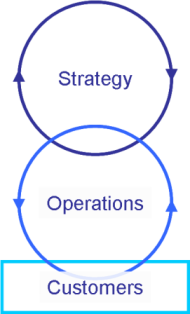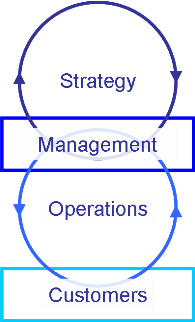Most of the managers that I work with have an incredibly detailed knowledge of the organisations that they work in – or at least of the parts of it that they come into regular contact with. Far fewer have a good understanding of what their own organisation looks like from a more strategic or higher level perspective. This imbalance in perspective can cause too much focus on the here and now and not enough consideration of the medium and longer term. This deceptively simple, yet powerful model can help to restore a bit of balance.
It starts of with a recognition that every organisation does something (operations) for someone (customers). Whether the operation is about providing a service or a product – understanding what you provide to your customers – and their level of satisfaction is clearly important.

Just considering these two parts of the organisation can raise a host of powerful questions:
- Who are our customers?
- Why do they choose us?
- What do they love about we do?
- What do they hate?
- What do they pay for? What else might they pay for?
- What do they use? What else might they use?
- How are our customers changing?
- How efficient are our operations?
- How effective are they?
- Where is there most scope for improvement?
- Who is responsible for managing operations?
- Who is responsible for managing customers?
- How effective is the working relationship between them?
Now let’s add a third component to the organisation that will help us to thrive into the future – a cunning plan – a strategy.

The strategy loop invests time and money in thinking about what the organisation should be doing today if it is to continue to thrive in the future. In simple terms the operational loop is about earning today’s bottom line. The strategy loop is about ensuring tomorrow’s. In many organisations the strategy loop is almost vanishingly small. Only a few people ever think about it – and acting on it is even rarer! Sometimes ‘strategy’ is done on an annual basis usually tied up with the planning process and budgeting. Often it is done in a top down way – strategy is conceived in the board room or the chief execs office and handed down for implementation. Frequently it does not exist at all!
This strategy loop opens up some further challenging and potentially very valuable questions:
- What is our strategy?
- How is it developed?
- Who is responsible for developing it?
- How is it communicated?
- Who is able to shape it?
This gives us a fuller picture of the organisation – but it is still not complete. A final component is required to link strategy and operations together. A component to ensure that operations inform strategy and that strategy is put into practice in operations. This component is management.

This is just about the simplest complete model of an organisation that I can imagine. A manager who is able to develop well founded knowledge of customers, operations, strategy and management is well placed to succeed.
A management team that is able to ensure balanced development of operations, management and strategy – driven by a thorough understanding of customers and their changing needs should be unstoppable.
- Is management equally effective at developing both operations and strategy?
- Does management make sure that what happens (operations) takes full account of strategy?
- Who is responsible for management in your organisation?
- How could management be improved?
This simple model of the organisation can provide a powerful catalyst for diagnosis and improvement.

